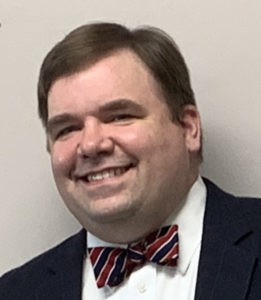I’m not exactly sure when or how it happened, but calling someone a sheep is now meant to be an insult.
In this new vernacular, being called a “sheep” or “sheeple” means you’re foolish and easily led astray. It means you’re docile and compliant, someone who can’t or won’t think for themselves. And while I know people have been using “sheep” as an insult for several years now, I must admit I was shocked to learn just how deep this new meaning has taken root.
The other day, I came across a video on CNN in which a reporter interviewed some attendees at a Trump rally in Cullman, Ala. Much was made of the former president holding a rally at all, considering that Alabama has the lowest vaccination rate of any state in the nation and that all the state’s ICU beds were full prior to the rally.

Kris Aaron
So, CNN sent an intrepid reporter to ask some of those in attendance their thoughts about the vaccine. All those shown in the clip refuse to get vaccinated, but one particular woman’s answers stuck out.
After telling the reporter that she didn’t trust the government or the CDC, this woman shared an experience she had with her own doctor. She admitted that her primary care physician had tried to convince her to get vaccinated, but that she refused to take it. Instead, she recommended that her doctor look up videos on the vaccine created by Sherri Tenpenny, an anti-vax conspiracy theorist who’s been labeled one of the “disinformation dozen” by the Center for Countering Digital Hate. Tenpenny has made several outlandish claims concerning the vaccine, including that COVID-19 vaccines make people “magnetized.”
When pressed by the CNN reporter, the attendee admitted that she trusts the internet more than she does her own doctor.
Later, this same woman claimed that the only TV she watches is “Prophets of God,” Newsmax, and a little Fox News. She then stated that she had really turned away from the news and that instead she wants to listen to what God is saying.
What left me not knowing whether to laugh or cry, however, was when she referenced Scripture. This woman told the reporter that she believes God is separating the sheep from the goats, a clear reference to Matthew 25. When asked which one she was, the woman chuckled and said that she was a goat, claiming she isn’t a sheep because she’s not going to do what they tell her and that she’s fighting against it. In case you don’t have your Bible handy, in Matthew 25, the sheep go to heaven and the goats go to hell.
“When asked which one she was, the woman chuckled and said that she was a goat, claiming she isn’t a sheep because she’s not going to do what they tell her and that she’s fighting against it.”
Now, I understand it’s possible this woman simply got the words of Jesus confused, but that seems unlikely. It’s possible that she’s just struggling with basic biblical literacy. She botched her own scriptural reference, after all, but I think that’s still not acknowledging the whole problem. While a lack of biblical literacy has led to a lack of spiritual formation, we’re seeing that problem compounded by something else. What we’re seeing is spiritual malformation.
Over the last year and a half, from both the pulpit and in writing, I have spoken out against violence done in Jesus’ name (see Jan. 6 where people carried banners reading “Jesus Saves” as they attacked the Capitol), spoken about the importance of telling the truth in a world filled with disinformation, and spoken about how we can love our neighbors as ourselves during a time of pandemic, which includes wearing a mask and getting vaccinated. And the vast majority of the congregation I serve has been overwhelmingly supportive when I’ve done so. For that I am incredibly appreciative because I realize I have been afforded a level of support many of my friends and colleagues in ministry haven’t.
I’d be lying, though, if I didn’t admit that some congregants have gotten mad, accused me of being “political,” and left the church. These sorts of accusations have led me to a conclusion. For years, pastors of various persuasions have remained silent on issues that were considered to be “controversial,” even if those issues were clearly biblical. They remained silent because they wanted to avoid conflict, so they focused on the unity of the churches they serve.
I’m not trying to point fingers here — I must admit I’ve done that more than a time or two myself. But in that silence, people have started listening to other things. They’ve become addicted to talk radio and cable “news.” They now do “research” by scrolling for memes on Facebook or watching videos on YouTube that all the world’s leading experts have somehow missed. They listen to others use religious language without testing it against Scripture to see if it has any substance because they like what they hear.
“What we’re seeing is spiritual malformation.”
In that void of silence, their spiritual lives have become malformed by other things. But while they bear responsibility for their actions, I’ve come to realize in new ways that as a pastor, my actions or inactions can affect theirs. My silence reflects complicity, and in good conscience, I can’t remain silent anymore.
I’ve heard from more people than I can count that they don’t recognize their friends and family members anymore, that pastors don’t recognize their congregations anymore. We’re seeing a rage building across this country as pandemic, misinformation, and prior problems and dysfunction mix together in a toxic stew. And the real fear is that all of this is going to get much worse.
But in the midst of all that, even though it’s now considered an insult, we’re still called to be sheep. As we read in Matthew 25, we’re still called to feed the hungry, give something to drink to the thirsty, welcome the stranger, clothe the naked, take care of the sick, and visit those in prison. As Scripture commands us, we’re still called to tell the truth in love. And we’re still called to do those things even if they’re considered “controversial” or “political.”
While it probably won’t happen, I hope my words find that woman who was interviewed in Alabama. I hope she’ll decide to quit being a goat and start being a sheep. I hope she’ll take these words to heart. Even if she won’t listen to her own pastor, I hope she’ll listen to this column, because these words are on the internet, and apparently that means they have to be true.
Kris Aaron serves as senior pastor of First Baptist Church in Bristol, Va. He holds the doctor of ministry degree from McAfee School of Theology at Mercer University, the master of divinity degree from Mercer and a master of theology degree from Brite Divinity School at TCU. He is married to Clary Gardner Aaron, and they are the parents of two young children.
Related articles:
Sermons stretch as biblical literacy wanes
Are you sure the Bible actually says that? | Opinion by Russ Dean
Like it or not, we are like sheep – including our vulnerability to ‘thieves and wolves’ | Opinion by Wendell Griffen


